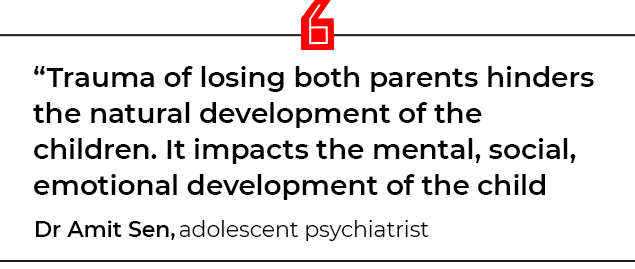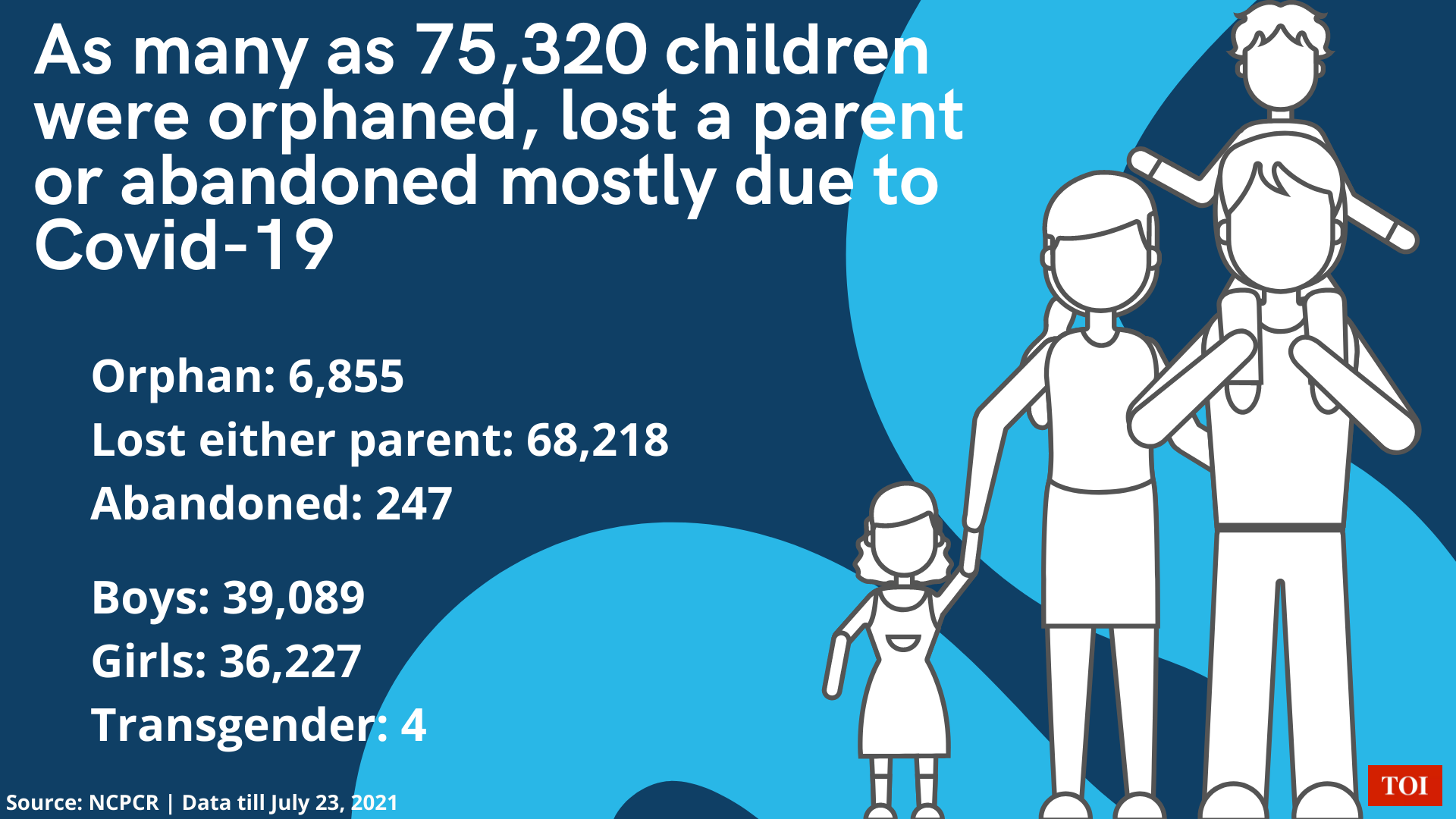Take Radhi for instance. The six-year-old was found sitting next to her mother’s lifeless body at a traffic signal on a busy road in Haryana’s Faridabad town. Her father had succumbed to Covid-19, a couple of days back and now the disease had taken away her mother too.
Or take the instance of the Class 11 Lucknow girl who lost both her parents in a span of days.
In a recent incident in Maharashtra, four siblings in the age group of 10-16 years, lost both their parents. Two of them even needed special attention as they were physically challenged.
Track back to Noida where Fatima (10) and her siblings — Nabina (8), Asif (5) and Umar (3)— lost their mother to Covid in May this year. The children now live in a crude shelter in a Noida slum.
Lost childhood
The National Commission for Protection of Children’s Rights (NCPCR) in a recent report to the Supreme Court has said that because of the pandemic 6,855 children were orphaned, 274 were found abandoned and 68,218 lost a parent between April 1, 2020 and July 23, 2021.
NCPCR in its report said that the number of children affected between the age group of 0-3 years are 7,999, 4-7 years group are 13,254 and 14-15 years are 11,799. It also said that children affected between 16 and 18 years are 12,382.
However, child-rights activists believe that the numbers are likely to be higher.
These orphaned children not only have to cope with the emotional trauma of losing both parents but there are physical hazards too.
Violence. Child labour. Trafficking. Child marriage. Sexual exploitation. Orphaned children are placed at a heightened risk of neglect and exploitation.
“These children could be forced into child labour for survival or can fall prey to traffickers, drug peddlers, paedophiles or the begging mafia,” says Sumanta Kar, secretary-general of SOS Children’s Villages of India.
Recently, around 30 children were rescued. They were being taken to Jaipur from Bihar to work in bangle-making units. The children were in the age group of 10-16 years.
At the grassroots level, there are no child protection committees or systems, says Roop Sen, an activist and founding member of the Kolkata-based nonprofit Sanjog. According to him village or district child protection committees are non-functional.

“Recently there were advertisements on social media of children up for adoption. These could be a trafficking operation and anti-trafficking units should react. But our systems failed,” he says.
Besides trafficking and related crimes what is also worrying child activists is the psychological scars left behind.
Orphans and mental health
“This [trauma of losing both parents] hinders the natural development of the children. It impacts the mental, social, emotional development of the child. Children even go through depression and anxiety,” Delhi-based child and adolescent psychiatrist, Dr Amit Sen says.
Children who need special care go through deeper traumas, Dr Sen adds, as they’ve lost their main caregivers. “The effect on these kids is devastating,” he says.

Dr Sen gives the example of a 14-year-old child who had lost a parent and the other was in an intensive care unit. The child had to stay in the ICU and the experience left him traumatised. “The emotional scarring can be life long,” Dr Sen says.
Delhi-based psychologist Dr Nisha Khanna acknowledges the fact that orphaned children go through intense emotional trauma and abandonment.
“It is very painful for them because they are not mentally prepared for such losses. Even as adults we go through emotional upheaval at such a loss, you can imagine how much this situation would impact the children,” she says.
Are we failing our children?
Counsellors and psychologists believe that such children with physical, emotional and mental health issues, need counselling.
However, when it comes to the grassroots level, child activists are concerned about the serious lack of professionals.
“In India there aren’t many trained counsellors or psychologists. Also, the delivery of counselling is not well. The kind of emotional support these children need is not available,” says Suresh Kumar, executive director of Centre Direct, a nonprofit in Bihar working to rescue and rehabilitate trafficked child labourers.

Of little help
Supreme Court on May 28 took note of children who have become orphans due to the Covid-19 pandemic and directed the states to provide immediate relief to them.
Several states have announced relief packages and compensation for orphans. But are these compensations enough to cushion the impact of the pandemic on children’s lives? Experts don’t think so.
Giving Bihar’s example, Centre Direct’s Kumar says that the monthly relief of Rs 1,500 is not enough for survival. “There are even chances that the money may not reach these children. We don’t need traditional ways of supporting children, which have failed,” he says.
According to him, benefits from several social welfare schemes never reach the intended beneficiaries. Either because they are unaware of their eligibility or cannot manage the complicated procedures and documentation required to access the aid.
For most of us the pandemic has changed the way we live. But for Covid orphans it is more than that. It is an existential crisis for these children.
*Names of children have been changed to protect anonymity







More News
Why everyone is talking about Pandian in Odisha | India News – Times of India
Internship Alert, Apply For A Chance To Intern At NITI Aayog Before May 10 Deadline!
‘What do you call a person who flees the battleground?’ | India News – Times of India